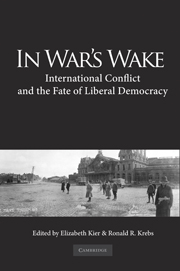Book contents
- Frontmatter
- Contents
- List of Contributors
- Acknowledgments
- 1 Introduction
- PART I WAR AND DEMOCRATIC TRANSITIONS: NEW AND DURABLE DEMOCRACIES?
- PART II WAR AND DEMOCRATIC PUBLICS: RESHAPING POLITICAL PARTICIPATION?
- PART III WAR AND DEMOCRATIC STATES: GOVERNMENT BY THE PEOPLE OR OVER THE PEOPLE?
- 9 International Conflict and the Constitutional Balance
- 10 Claims and Capacity
- 11 War, Recruitment Systems, and Democracy
- 12 Concluding Reflections
- References
- Index
9 - International Conflict and the Constitutional Balance
Executive Authority after War
Published online by Cambridge University Press: 05 June 2012
- Frontmatter
- Contents
- List of Contributors
- Acknowledgments
- 1 Introduction
- PART I WAR AND DEMOCRATIC TRANSITIONS: NEW AND DURABLE DEMOCRACIES?
- PART II WAR AND DEMOCRATIC PUBLICS: RESHAPING POLITICAL PARTICIPATION?
- PART III WAR AND DEMOCRATIC STATES: GOVERNMENT BY THE PEOPLE OR OVER THE PEOPLE?
- 9 International Conflict and the Constitutional Balance
- 10 Claims and Capacity
- 11 War, Recruitment Systems, and Democracy
- 12 Concluding Reflections
- References
- Index
Summary
In recent years, Americans witnessed assertions of presidential prerogative and a concerted effort to sideline Congress that were unequalled in the preceding three decades. Some hailed these developments, alongside increased government surveillance, as the price to be paid for a “War on Terror” whose effective prosecution required nimble governance. Others warned that Americans were, in this “long war,” too swiftly relinquishing their hard-won freedoms and too readily acquiescing in the emasculation of the legislative branch. They feared that even if the United States should one day declare victory over terror – whatever that might mean – it might be too late to save the country's darkened soul.
This debate raised crucial questions. Do security-driven restrictions on liberty and expansions of executive authority become a new baseline, from which future crises compel further departures? Or are such measures rescinded, or at least substantially scaled back, once the emergency passes? Are both claims true, but only under certain conditions? What then is the likely staying power of post-9/11 initiatives? This chapter does not focus on developments in the United States since 2001, but they are a silent presence. And the concern is not only an American one: In the name of combating terrorism, countries around the world have extended detention without charge, limited speech, reduced government transparency, and hampered political opposition.
In this chapter, I argue that, beyond the scale of war, how military operations are represented affects the fate of wartime measures expanding executive authority and contracting individual freedoms.
- Type
- Chapter
- Information
- In War’s WakeInternational Conflict and the Fate of Liberal Democracy, pp. 187 - 210Publisher: Cambridge University PressPrint publication year: 2010
- 4
- Cited by



